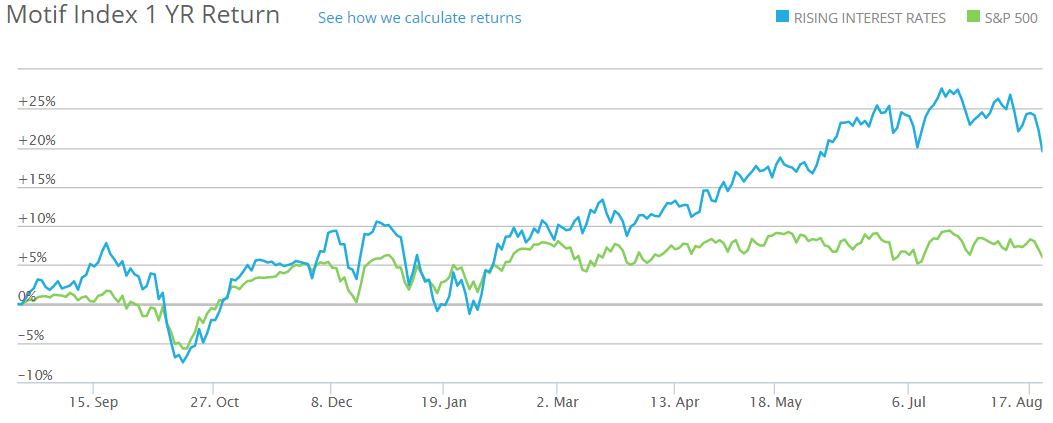The benchmark federal funds rate has not risen in nine years. It was lowered to almost zero in attempts to strengthen the U.S. economy after the 2008 financial crisis.
But with signs indicating the economy has strengthened, analyst consensus estimates suggest that the Fed may raise interest rates by up to 50 basis points, possibly split in two installments.
Active investors are closely monitoring the Fed as anticipation grows.
This begs the question: How soon will rates rise?
As early as next month, according to a Wall Street Journal survey of economists; 82 percent believe the first rate increase will occur in September 2015. Only 13 percent said they think the Fed will wait until December.
Yet the recent devaluation of the Chinese yuan by nearly 2 percent may complicate the Fed’s appetite to raise rates.
The weaker yuan appears to be putting upward pressure on the U.S. dollar, which negatively impacts the growth of many American companies doing business in China. Economists have been concerned that other countries could follow China’s lead and devalue their currencies as well.
Here are seven things you might want to keep in mind in a rising rate environment.
What About Fixed Income?
When interest rates rise, shouldn’t bond prices go up too? That depends on which bonds you’re talking about–the prices of previously issued bonds actually go down as rates rise. It’s the prices of new auctions that go up, according to bond market thinking.
Bonds with shorter maturities and higher credit ratings have historically tended to be less affected by rate changes because investors get their money back sooner. Past performance has also shown that bonds with longer maturities have often been more sensitive to an interest rate change.
Investors have addressed this situation with a strategy known as laddering, staggering maturities and reinvesting the proceeds as each position matures.
Cash Is King
Investors anticipating interest rate hikes have had a tendency to sell off stocks amid fears of slowing consumption and higher opportunity costs.
The aftermath of these selloffs has historically created opportunities to buy equities at low prices. Investors who have been able to take advantage of during these conditions have maintained cash balances.
Stocks In Large Banks And Brokerages May Benefit
If you decide to go shopping for equities during a rising rate environment, keep in mind the sectors that tend to benefit from higher rates. Stocks in financial institutions have historically performed well during rising rate environments, since higher interest rates can mean increased revenues on loans.
Larger institutions also tend to benefit more than smaller ones, due to the former having more flexibility in managing profit margins, hedging risk, and launching new products.
Insurance Stocks May Thrive
Insurance companies have tended to benefit from rising interest rates. Stronger consumer sentiment has typically led to an increase in property and auto sales, which can result in more insurance policy sales. Insurance companies’ underlying bond investments have also yielded better returns during rising interest rate environments.
Utilities, Telecoms And Highly Leveraged Stocks Could Take A Hit
Meanwhile, certain sectors and companies tend to become riskier when rates rise. Utilities, telecommunications and other sectors that tend to pay high dividends can be hit harder than the rest of the market.
Highly leveraged energy companies, real estate trusts and master limited partnerships also tend to be negatively impacted. Companies with a lot of debt face rising debt servicing costs and higher risks of default. If you hold a lot of floating rate debt, you may also feel a stronger pinch.
Exporting Costs May Rise
The value of the U.S. dollar has risen with interest rates in the past, and that in turn has made U.S. assets more attractive to investors. However, American companies largely dependent on exports have experienced revenue declines in rising rate environments when their goods become more expensive abroad.10
Don’t Let Volatility Cause You To Panic
Despite a large percentage of analysts believing a rate hike may occur by year end, there is still some uncertainty about the details and timing—and markets have tended to exhibit volatility when monetary policy has appeared uncertain.
The performance of the Rising Interest Rates motif is below.

No matter what the markets do, remember to maintain your focus on your long-term goals—successful traders have said they avoid letting their emotions get the better of them. Ultimately, how the market reacts depends on the differences between expectations and what actually ensues.
© 2025 Benzinga.com. Benzinga does not provide investment advice. All rights reserved.
Trade confidently with insights and alerts from analyst ratings, free reports and breaking news that affects the stocks you care about.